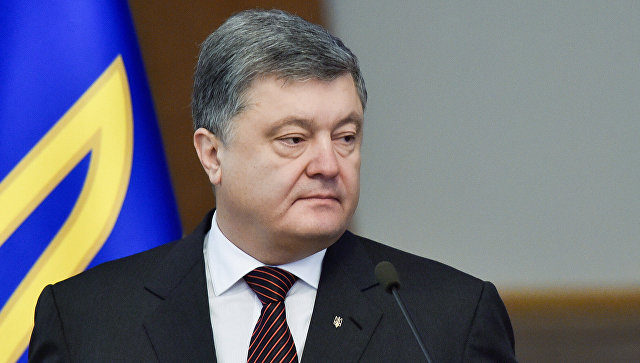
Ukrainian President, Parliament Greenlight Court to Fight Top-Level Corruption
Publication: Eurasia Daily Monitor Volume: 15 Issue: 90
By:

On June 7, Ukraine’s parliament passed a long-awaited bill to establish an anti-corruption court, and President Petro Poroshenko promptly signed it into law four days later. The anti-corruption court is supposed to be the last link in the chain of bodies designed to fight top-level corruption. Under pressure from the United States, the European Union and international credit institutions, Kyiv established the first three of them between 2014 and 2016—the National Anti-Corruption Bureau of Ukraine (NABU), the Specialized Anti-Corruption Prosecutor’s Office and the National Agency for Corruption Prevention.
Without the anti-corruption court, it has proved difficult to imprison corrupt top-level officials. The NABU complains that existing courts often thwart efforts to bring them to justice. In many cases, officials suspended over investigations into large-scale embezzlement were restored to their positions by the courts (Rbc.ua, January 29; Gordonua.com, February 8). Continuing reforms of the justice system have not freed judges from political and economic influence. Moreover, many of them flaunt their wealth, clearly living beyond their means. This calls into question the very idea of fighting top-level corruption in Ukraine, while a significant proportion of public funds and international assistance disappears without a trace.
The anti-corruption court is supposed to change this through built-in mechanisms ensuring the independence and honesty of its judges. Probably the most important of these mechanisms, and one that President Poroshenko’s team had staunchly opposed all the way up until the vote in the legislature, is a panel of international experts to vet judicial candidates if doubts exist about their integrity or background. There was no place for such a panel in the original anti-corruption court bill, which Poroshenko submitted to the parliament last December. His team, which claimed the requirement violated Ukraine’s sovereignty, backed down only under pressure from the G7, Washington in particular, and international credit institutions. The International Monetary Fund (IMF) made it clear that it would stop lending to Kyiv if the law did not provide for setting up the panel of international experts (Ukrinform.ru, June 6).
Finally, while addressing the parliament ahead of the vote, Poroshenko announced that a compromise with the IMF was reached. He said the final version of the bill, just as the IMF and the G7 wanted, was in line with both the Ukrainian constitution and recommendations of the Venice Commission, Europe’s leading advisory body of legal and constitutional experts. At the same time, Poroshenko stressed that the law would be “not for the Venice Commission, not for the Council of Europe, the European Union or the USA, but for Ukraine” (President.gov.ua, June 7).
According to the final version of the bill, a candidate for judge of the anti-corruption court may be vetoed by a panel of international experts if at least three of the panel’s six members reject the candidate, said the head of the parliamentary law committee, Ruslan Knyazevych. After that, a joint meeting of the international experts and the Ukrainian qualification commission is to approve the veto by a majority vote, including at least three votes from the international experts. Also, the experts may invite candidates for interviews (Pravda.com.ua, June 7).
Opponents of the anti-corruption court were overwhelmingly defeated in the final legislative vote, as more than two thirds of people’s deputies, 315 in the 450-seat unicameral parliament, voted in favor of the bill. Most of the votes against came from the Opposition Bloc, widely regarded as the political successor of the Party of Regions, whose notoriously corrupt leaders ran Ukraine until the EuroMaidan uprising in 2013–2014. Additionally, most representatives of the populist Radical Party abstained (Liga.net, June 7).
The approval of the bill may convince the EU to disburse a new one-billion-euro loan to Ukraine. The European Parliament is expected to vote on the loan on June 13 (Segodnya.ua, June 6). However, it is not yet clear whether the IMF will be equally convinced. Along with the anti-corruption law, the IMF has, since last year, been expecting Ukraine to increase domestic natural gas tariffs in order to balance the state budget. Higher gas prices should also encourage private consumers and utility companies to cut gas consumption, further diminishing Ukraine’s dependence on imported gas, IMF First Deputy Managing Director David Lipton said in a recent interview (Rbc.ua, April 26). Yet, the government has been reluctant to increase energy prices ahead of the elections scheduled for next year.
Fears persist that the ruling elite will drag its feet over the establishment of the anti-corruption court, which is viewed as a serious threat to certain vested interests. NABU chief Artem Sytnyk believes that six months should be enough to establish the court. At the same time, he doubts the authorities will rush (112.ua, June 11). The law provides for setting up the anti-corruption court within 12 months, so it may be established after next March’s presidential election. However, it must be established before the parliamentary election scheduled for fall 2019, so that its first verdicts may influence the election outcome.



